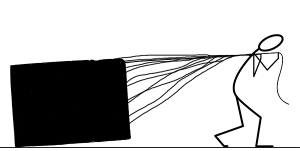 “No matter how much work I get done, there’s always more to do.”
“No matter how much work I get done, there’s always more to do.”
Does this sound familiar? If you’re anything like most people, often you’ll find yourself overcome with responsibilities.
You keep playing catch up.
But if you just take things one step and a time, you can start to make a dint in your pile of things to do. Eventually, the list gets smaller and smaller, and it stops causing you so much anxiety. You can deal with procrastination. It’s possible.
Here are 5 simple strategies to help you.
Write Your Goals Down
It’s very important to write your goals down on paper. If you don’t keep track of what you’re trying to do each day, then everything else falls apart. So at the start of each day, take some time to write down the big three things you want to accomplish. Be as specific as you can because you need to be able to track when you do reach that goal. Make sure your goals are small enough to be manageable and possible to complete. If you think of big tasks to do, break them down into little ones, because if your tasks are too big then you probably won’t even attempt them to begin with.
Set Priorities
Take all those goals you’ve written down and put them in order. What MUST you complete today? Are there bills due? Do you have appointments? Then make sure which goals will get you closest to where you want to be in your life. Some may be more important than others right now, make sure to focus on those too. It can also help to start your day with the most difficult task when you have plenty of energy to tackle it.
Plan Out Your Day
Okay, now you’ve got your goals and ordered them, next thing to do is to make a plan. When are you actually going to do each of these things? This shouldn’t take any more than 5 minutes to work out. As I mentioned before, do your most important task first and then work from there. Try to set time limits for each task. If a task is going to take more than an hour, then try to split it into multiple tasks or at least have a break every hour. Breaks are important because they refresh your mind and allow you to concentrate better later.
Stop Multi-tasking!
Most people think that they’re good multitasksers. The truth is that nobody really is. When we switch between tasks we lose attention and it takes some time to get that focus back. Close down all distractions and only do one thing at a time, and do it well. Finish it completely before moving onto your next task.
Make Sure You Reward Your Efforts
Take breaks every hour, and when you do, do something fun. Make your breaks last at least 15 minutes and, if you can, get some brief exercise. At least get out of your chair and walk around. When you walk around you release endorphins which actually wake you up and help you concentrate even more later. A bit of sunlight doesn’t go astray either!
So those are my tips. I hope that they help you out. If you’re interested in finding out more, click here to download my free productivity guide.

 Be honest: Do you put things off that you know you should be doing?
Be honest: Do you put things off that you know you should be doing?